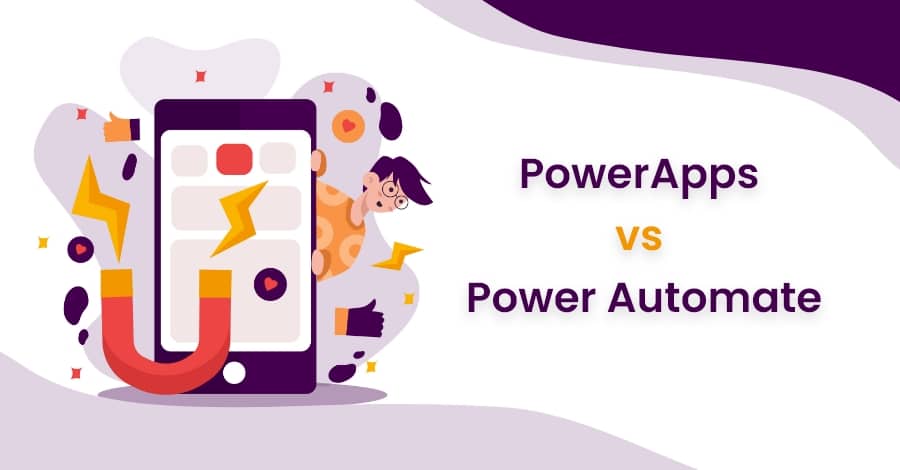

In today’s fast-paced digital era, businesses of all sizes are looking to streamline processes and increase efficiency. When it comes to automating business processes, two popular Microsoft solutions often come to mind: Power Automate and Logic Apps. These powerful tools enable businesses to streamline their workflows, improve productivity, and save time and resources. But how do you determine which one is the right fit for your specific needs? In this blog post, we’ll dive into the details and compare Power Automate vs Logic Apps, helping you make an informed decision.
Understanding Power Automate
Power Automate, formerly known as Microsoft Flow, is a cloud-based service that allows users to create automated workflows between various applications and services. It offers a user-friendly interface with a no-code or low-code approach, making it accessible to both technical and non-technical users. With Power Automate, you can integrate different platforms, such as Office 365, SharePoint, Dynamics 365, and hundreds of other connectors, to automate repetitive tasks and streamline your business processes.
Exploring Logic Apps
On the other hand, Logic Apps is an Azure-based service designed for developers to create scalable and complex workflows. It provides more advanced capabilities and customization options compared to Power Automate. Logic Apps use a graphical designer that allows developers to build workflows by connecting predefined actions and triggers. With a wide range of connectors and integration options, Logic Apps can seamlessly connect with various Azure services, third-party applications, and on-premises systems.
Power Automate vs Logic Apps: Comparison
- Ease of Use
Power Automate has a user-friendly interface with a visual designer, allowing users to create workflows using a drag-and-drop approach. It’s well-suited for business users who want to automate simple tasks without much coding knowledge.
Logic Apps require a higher level of technical expertise. Developers can use Visual Studio or the Azure portal to design and implement more complex workflows.
- Integration Capabilities
Both Power Automate and Logic Apps offer a wide range of connectors to integrate with popular services and platforms. Power Automate focuses more on business-oriented applications, such as Office 365, SharePoint, and Dynamics 365. Logic Apps, being part of the Azure ecosystem, provides seamless integration with Azure services, on-premises systems, and third-party applications.
- Customization and Flexibility
While Power Automate provides a good level of customization through its templates and actions, Logic Apps offer more advanced customization options. Developers can leverage their coding skills to create complex workflows using custom code, expressions, and API connections.
Logic Apps are highly scalable and can handle enterprise-level workflows efficiently.
- Pricing Model
Power Automate offers different pricing plans, including a free tier with limited features and higher-tier plans with more advanced functionality and enterprise-grade capabilities.
Logic Apps, being a Microsoft Azure service, follows the Azure pricing model, which is based on usage and resource consumption. It provides more flexibility in terms of scaling and paying only for what you use.
- Workflow Triggers and Actions
Both Power Automate and Logic Apps offer a wide range of triggers and actions to initiate and execute workflows. Power Automate supports triggers such as scheduled time, incoming emails, and changes in data in SharePoint or Dynamics 365. Additionally, it provides actions like creating tasks, sending emails, and updating records in various applications.
In contrast, Logic Apps offers more diverse triggers, including HTTP requests, webhooks, and Azure service events. Its actions encompass a vast array of Azure services and advanced actions, enabling seamless integration and automation within the Azure ecosystem.
- Conditional Logic and Expressions
Power Automate comes equipped with a set of built-in expressions and conditions that enable conditional logic in workflows. This allows users to create if-else conditions and loop through data to implement logic based on specific criteria.
In comparison, Logic Apps provides more extensive and powerful expression capabilities. Developers can use Azure Functions and write custom code within the workflow to handle complex conditional logic and transformations on data. This flexibility empowers developers to achieve more intricate automation scenarios.
- Error Handling and Retry Mechanism
When it comes to error handling and retrying failed actions, Logic Apps offer more robust capabilities. It allows developers to configure custom retry policies, specify how many times an action should be retried, and set delays between retries. Additionally, developers can use scope actions to implement compensatory actions if an error occurs.
Microsoft Power Automate provides some basic error handling options, but it is more focused on guiding users with informative messages when something goes wrong rather than offering advanced error handling strategies.
- Integration with On-Premises Systems
If your organization heavily relies on on-premises systems and applications, Logic Apps might be the better choice. Logic Apps has connectors and gateways that enable secure communication with on-premises systems, databases, and files. This capability allows businesses to integrate their cloud-based workflows with existing infrastructure seamlessly.
On the other hand, Power Automate is predominantly cloud-focused and may require additional configuration and setup to connect with on-premises resources. It is better suited for businesses that primarily operate in cloud environments.
- Community and Templates
Both Power Automate and Logic Apps benefit from a supportive community of users and developers. Power Automate’s extensive user base has led to the creation of a vast library of pre-built templates for various use cases. These templates can be customized and used as starting points for new workflows, saving time and effort.
Likewise, Logic Apps also have a growing library of templates shared by developers, which accelerates the creation of new workflows. The community’s contributions ensure that both platforms continue to evolve and cater to a wide range of automation needs.
How to Decide Power Automate vs Azure Logic Apps
To determine whether Power Automate or Logic Apps is the right fit for your needs, consider the following factors:
- Complexity of Workflows
If you require complex workflows with advanced customization and coding capabilities, Logic Apps might be the better choice. For simpler workflows that require minimal coding, Power Automate is a more accessible option.
- Technical Expertise
If you have a team of skilled developers who are comfortable with coding and Azure services, Logic Apps would be a good fit. However, if you want to empower business users and citizen developers to automate tasks without extensive coding, Power Automate is the way to go.
- Scalability and Integration Requirements
Consider the scalability and integration requirements of your workflows. Logic Apps are designed for scalability and can handle high-volume enterprise workflows seamlessly. If you primarily need to integrate with Azure services and have complex integration scenarios, Logic Apps would be a suitable choice. For integration to Office 365 and other Microsoft products Power Automate provides excellent connectivity options.
Conclusion
Power Automate and Logic Apps are powerful automation tools that cater to different user needs. Power Automate offers a user-friendly interface and is ideal for business users looking to automate simple tasks and workflows. Logic Apps, instead, provides advanced customization options and is better suited for developers who require complex workflows and integration scenarios.
Assess your specific requirements, technical expertise, and workflow complexity to determine which tool aligns better with your needs. Whether you choose Power Automate or Logic Apps, you’ll gain significant benefits in terms of process automation, improved productivity, and streamlined business operations.
Experiencing uncertainty? Seek guidance from our experts! At Star Knowledge, we offer assistance in determining the ideal course of action and selecting the platform that perfectly aligns with your requirements. Contact us now to schedule a call with our knowledgeable consultants.
Our Related Posts
Power Automate for Wealth Management: Automating Manual Tasks to Improve Efficiency
In the fast-paced world of wealth management, time is money. Financial advisors and wealth managers are….
PowerApps vs Power Automate: What’s Better for Your Workplace?
Today’s business users are constantly looking for ways to make their lives easier and cut down on energy….
Reasons Why You Should Use Power Automate In Power BI
Microsoft Power Automate is a powerful solution that enables seamless integration between multiple platforms…





Sorry, the comment form is closed at this time.